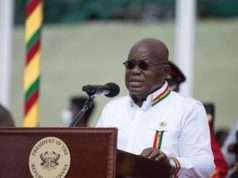Minister for Lands and Natural Resources Mr Samuel Abu Jinapor has disclosed that the implementation of the local content policy regarding the procurement of goods and services in Ghana generates $1 billion annually.
He explained that but for this policy, the purchasing of these goods and services would have gone to other countries.
Mr Jinapor made the disclosure when he appeared before Parliament to respond to a question by Mr Elvis Morris Donkoh, Member of Parliament (MP) for Abura Asebu Kwamankese on new measures adopted to enhance local content in the procurement of goods and services and which areas have been preserve for Ghanaians.
Sustainable mining
The Lands and Natural Resources Minister also explained that government’s overall policy objective for the mining is to build a viable, sustainable, indigenous and environmentally sound mining industry with strong local content participation.
He said pursuant to this vision, in 2020, government promulgated the Minerals and Mining (Local Content and Local Participation) Regulations, 2020 (L.I.2431) to, among others, promote job creation through the use of local expertise, achieve some minimum local level and in-country spend for provision of goods and services, maintain a degree of participation for Ghanaians and Ghanaian companies in the mining industry value chain and develop capacities in the mining industry value chain through education, skills transfer and expertise development etc.
He said the law requires mineral rights holders to develop for approval of the Minerals Commission, a localisation programme for the recruitment and training of Ghanaians, and a procurement plan to buy goods and services with Ghanaian content.
Mr Jinapor further stated that regulation 7 of L.I.2431 empowers the Minerals Commission to publish in the Gazette, on its website and in a newspaper of national circulation, a local procurement list which stipulates the goods and services with Ghanaian content which are to be procured in the country by mineral rights holders.
He said pursuant to this, the Minerals Commission as at 3rd March, 2022 concluded discussions with all stakeholders, including the Ghana Chamber of Mines and has increased the goods and services to be procured locally from 29 to 41.
In addition, regulation 10 of L.I.2431 requires minerals rights holders to insure their insurable risk with companies licensed by the National Insurance Commission (NIC), unless expressly authorized by the NIC, and regulation 12 requires mineral rights holders to retain the services of financial institutions incorporated in Ghana for their operations that require financial transactions, with at least 20 percent reserved for financial institutions owned by Ghanaians.
He also indicated that the Minerals Commission since the beginning of the year has been working with the Bank of Ghana and the National Insurance Commission has submitted to the Ghana Chamber of Mines a list of all insurance companies licensed by the NIC and list of banks incorporated in Ghana and those owned by Ghanaians.
He said mineral rights holders have been directed to ensure full compliance with the requirement and the Minerals Commission is working with them to ensure that they comply fully.
Community mining
On Community Mining the Lands Minister said the government is determined to make Community Mining Scheme (CMS) the model of small-scale mining.
He added that the Ministry of Lands and Natural Resources was working not to limit the idea to the country but also across the continent, with the government not stopping short of anything to achieve the goal.
He said in accomplishing the set goal, the Ministry through the Minerals Commission was investing in the mercury-free ore processing equipment, known as “the Gold Katcha” where 100 of them had been procured for CMS across the country.
CMS was rolled out by the government of President Akufo-Addo in 2019, as a substitute for illegal small-scale mining.
“Mr Speaker, in 2021, we revamped the Community Mining Scheme, and we have since reformed and clarified the legal, policy and operational framework of the scheme, to provide a clear pathway for responsible and sustainable small-scale mining with community ownership,” he told Parliament.
Mr Jinapor noted that working with the Minerals Commission, the Ministry had developed an Operational Manual, that had set standards and guidelines which all CMS must meet and or comply with.
“Mr Speaker, the Small Scale and Community Mining Operational Manual was launched by my supportive Deputy Minister and Member of Parliament for Tarkwa-Nsuaem Constituency, Hon. George Mireku Duker on Friday, 5th November 2021 at Tarkwa in the Western Region. The overall objective of the 32 pages Operational Manual is to ensure that Community Mining Schemes operate in a safe and healthy environment and that their operations are sustainable and environmentally sound.
Mr Jinapor said steps have been taken to educate community members on the operational manual
He also noted that so far 150 CMS had been built and the ministry hoped to build more by 2022 adding that out of the 100 procured “Gold Katcha”, 20 had so far been installed.
It is intended to provide members of the community with the opportunity to engage in responsible viable, sustainable, and environmentally-sound mining for the benefit of the community.
In 2020, 20 CMS were commissioned in fourteen mining districts across the country.









































